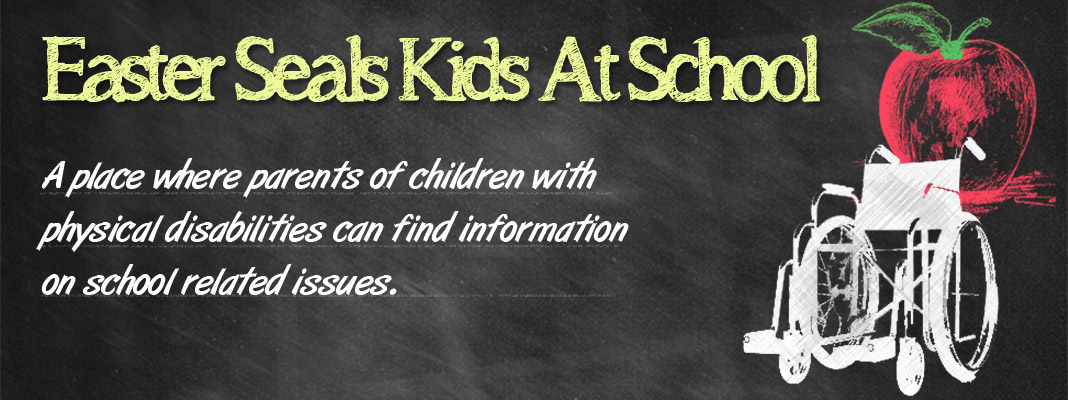Easter Seals Ontario advocates for the needs of children and youth with physical disabilities and provides information to families about the special education system in Ontario. Some children and youth with physical disabilities also have developmental disabilities. Planning for young people with physical and developmental disabilities is very challenging. This article provides information on the transition process to adult developmental services. This may only be one type of the support that will be required by young adults with multiple disabilities.
At the age of 18 years individuals with developmental disabilities can apply for adult services through Developmental Services Ontario (DSO). DSO agencies help adults with developmental disabilities find services and supports in their community. Services and supports for adults with developmental disabilities are not mandated and the types of services and supports available vary by community. There are currently wait lists for all services, with the longest waits for residential services and supports. This means that it is important to apply as early as possible to DSO.
Planning for adult services should begin well before the age of 18. School boards are required to include a transition plan in the Individual Education Plan (IEP). The IEP is reviewed every term or semester and this includes a review and update of the transition plan. Discussion about an application for supports to DSO should be part of transition planning.
There are 9 regional DSO agencies and the names and contact information for each agency is available on the Developmental Services Ontario website.
Publicly funded services for adults with developmental services include:
- Residential Services and Supports – residential supports including group homes, group living and supported independent living
- Community Participation Services and Passport – supports from a community agency, or through Passport individualized funding, for social activities, developing self help skills, learning activities, volunteering or pre-employment training
- Caregiver Respite – in home or community respite to give primary caregivers a temporary break from the routine of providing care to a family member with a disability
- Person Directed Planning – support to help a person with a developmental disability to develop a plan to help live their dreams and meet their goals.
- Adult Protective Services Worker – a worker to help an individual with developmental disabilities to take care of things they need for everyday living, as well as to set and achieve goals
- Specialized Supports – to treat and support adults who have developmental disabilities and mental health needs and/or challenging behaviours (ie. dual diagnosis) in the communities where they live.
- Passport Funding – people receive funding to choose and pay for supports and services directly. (For example, they can hire their own job coach or personal support worker and use the funding they receive to pay them.) People can also use this funding to purchase support from an agency directly.
Individuals with a developmental disability must apply through DSO for supports in their community. The application process involves two steps:
- Determination of Eligibility for Services – requires a psychological assessment that confirms the individual has significant cognitive impairment and functional deficits. Past assessments may be accepted.
- Determination of Needs and Service Requirements – The Support Intensity Scale is used to find out what supports the person needs in the home, in the community, in the workplace as well supports needed for behaviour and health and safety
Information on the application process, and how you can prepare for the meeting with DSO staff, is available on the DSO website under applying for services & supports.
NEW FALL 2016! – A person who is eligible for developmental services through DSO may also be eligible for the Ontario Disability Support Program (ODSP). Students with a developmental disability, recognized by DSO, can apply for ODSP Income Support at age 18 and they will be recognized as having a disability, without having to repeat the disability eligibility process. They will have to meet the other criteria for ODSP, but this is one less step.
Parent Tips
- Start planning early and find out about Developmental Services Ontario www.dsontario.ca.
- Find out about the Ontario Disability Support Program Income and Employment Supports as your child may also be eligible for this program at age 18.
- The Individual Education Plan (IEP) must include a transition plan and must be reviewed each semester or term. At each review talk to the school staff about what you need to do prepare for an application to DSO.
- Find out what information you will need for the DSO application process and who can help you with the application process, or attend the meetings with DSO staff.
- Prepare for the application meetings by talking to your child, and other people who know the child, about their ideas for the future. ( See also DSO website information on Preparing for a Meeting)
- If your child is going to take part in the eligibility meetings talk to them about what will happen during the meeting. Make plans for what your child will do if they get tired or want to leave the meeting.
- If your child is eligible for DSO services and supports, they may also be eligible for ODSP.
- Find out from DSO about other community supports and services that can help your child as they leave school.
For more information see Developmental Services Ontario and talk to staff at your school board as part of transition planning and the Individual Education Plan review.
